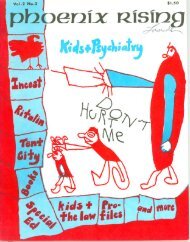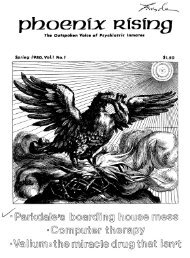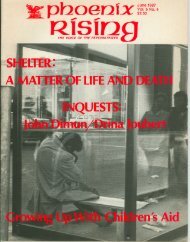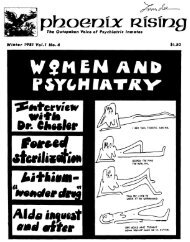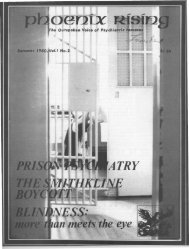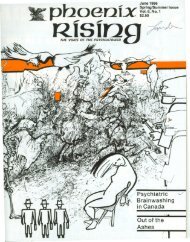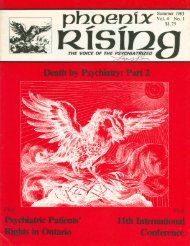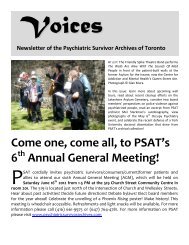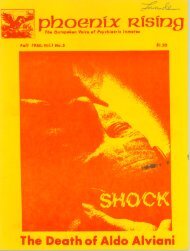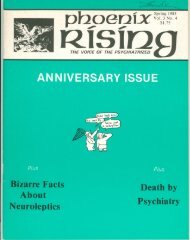Vol. 5, No. 4 - Psychiatric Survivor Archives of Toronto
Vol. 5, No. 4 - Psychiatric Survivor Archives of Toronto
Vol. 5, No. 4 - Psychiatric Survivor Archives of Toronto
You also want an ePaper? Increase the reach of your titles
YUMPU automatically turns print PDFs into web optimized ePapers that Google loves.
VOTING RIGHTS<br />
RESTORED TO<br />
SOME INMATES<br />
On October 28, 1985, all psychiatric<br />
inmates, and inmates <strong>of</strong><br />
correctional facilities not under<br />
sentence, finally won the right to<br />
vote in municipal elections in<br />
Ontario. In December 1984, the<br />
government guaranteed psychiatric<br />
inmates the right to vote in<br />
provincial elections.<br />
Unfortunately, prisoners under<br />
sentence are still denied the<br />
right to vote in city, provincial and<br />
federal elections. (See our<br />
Charter issue, August 1985) .<br />
A few days before this historic<br />
amendment to the Municipal<br />
Election Act was passed, there<br />
was some heated debate in the<br />
Ontario Legislature. On October<br />
24, a number <strong>of</strong> MPPs expressed<br />
their views on giving psychiatric<br />
inmates the right to vote. Here<br />
are a few samples which were<br />
published in Hansard:<br />
Ido not care how they<br />
(inmates) vote, but are we<br />
being honest in saying<br />
they know how to vote?<br />
Having had some service as<br />
a psychologist in a mental<br />
institution, I have personally<br />
seen the kinds <strong>of</strong> patients<br />
who are there ... They are<br />
frail in ways that they just<br />
do not fully understand<br />
what the world is all about,<br />
nor do they understand<br />
the responsibility <strong>of</strong> a<br />
mayor, a trustee or the<br />
services that are provided ...<br />
- (Donald Cousens, Progressive<br />
Conservative<br />
member)<br />
Fortunately, most <strong>of</strong> the other<br />
provincial politicians did not<br />
share Cousens' patronizing and<br />
biased opinions:<br />
Imyself was unfortunate<br />
enough to spend a long time<br />
as a guest <strong>of</strong> a previous<br />
government in the Ontario<br />
Hospital in Kingston. My<br />
fellow patients took a lively<br />
interest in the elections, although<br />
they were not aI·<br />
lowed to vote. Clearly,<br />
they had the same range <strong>of</strong><br />
political opinion that one<br />
might find among any group<br />
<strong>of</strong> people. It seems to me<br />
intolerable that we would<br />
deny any citizen the right<br />
to vote by virtue <strong>of</strong> a disability<br />
... Iam particularly<br />
concerned, knowing that<br />
the member from York<br />
Centre (Mr. Cousens) is a<br />
psychologist. For him to say<br />
that a patient in a mental<br />
hospital might not be able<br />
to form an opinion about<br />
whom to vote for and what<br />
the issues <strong>of</strong> the day are is<br />
a shocking commentary on<br />
how people who are not<br />
laymen view mental disabilities<br />
...<br />
(David Reville, NDP member<br />
from Riverdale)<br />
<strong>Psychiatric</strong> inmates' rights got<br />
another boost from Bernard<br />
Grandmattre, the government's<br />
Minister <strong>of</strong> Municipal Affairs:<br />
My intention ... isto enfranchise<br />
these people with the<br />
right to vote. Thesepeopie<br />
have been disenfranchised<br />
for a number <strong>of</strong><br />
years. My intention ... is<br />
not to say that Iam a<br />
better-qualified person than<br />
anyone else ... (who) isa<br />
psychiatric patient. Iwill<br />
let the Lord prescribe this.<br />
We need to respect these<br />
people ... Iwould like to respect<br />
inmates, judges and<br />
psychiatric patients in the<br />
very same way Itreat my<br />
friends in this House.<br />
However, the Government<br />
<strong>of</strong> Canada itself continues·<br />
to violate this fundamental<br />
Charterright, because its<br />
Canada Elections Act (section<br />
4, 1970) still denies the<br />
right to vote in federal elections<br />
to all psychiatric inmates<br />
and prisoners. So far,<br />
Ontario is the only province<br />
which has extended the<br />
right to vote to psychiatric<br />
inmates and a few others.<br />
It's time that all the other<br />
provinces cleaned up their<br />
Acts and started respecting<br />
the rights <strong>of</strong>all Canadians.<br />
AVICTORY<br />
IN QUEBEC<br />
The right to vote has been extended<br />
to more Canadian<br />
inmates. On <strong>No</strong>v. 12, psychiatric<br />
inmates in Ontario voted for<br />
the firsttime in a municipal<br />
election; unfortunately, it is not<br />
known how many inmates voted<br />
in the province's psychiatric institutions.<br />
However, in <strong>Toronto</strong>'s<br />
Queen St. Mental Health Centre,<br />
which had its own polling station,<br />
105 inmates voted - about onefifth<br />
<strong>of</strong> the 580 eligible voters. The<br />
non -inmates in <strong>Toronto</strong> didn't do<br />
much better - only one-third<br />
voted.<br />
In Quebec, prisoners in the<br />
federal prisons were also finally<br />
allowed to vote in the last provincial<br />
election held on<br />
December 2. This breakthrough<br />
in prisoners' rights was the result<br />
<strong>of</strong> an historic lawsuit initiated by<br />
prisoner Jean-Louis Levesque.<br />
Levesque claimed that denial <strong>of</strong><br />
his right to vote violated Section 3<br />
DAMAGES AWARDED TARDIVE<br />
DYSKINESIA<br />
On January 3, 1985, US Distrist<br />
Court Judge Donald D.<br />
Alsop ordered the US Veterans<br />
Administration to pay 36-yearold<br />
Larry Hedin over two million<br />
dollars for the permanent<br />
damage and suffering he endured<br />
as a result <strong>of</strong> psychiatric<br />
druggingwhich caused the permanent<br />
neurological condition<br />
known as tardive dyskinesia<br />
(TO). Judge Alsop also awarded<br />
Hedin's ex-wife Susan $30,000<br />
for "loss <strong>of</strong> consortium" (partnership).<br />
In his ruling against<br />
the St. Cloud VA Medical<br />
Center in Minnesota, Judge<br />
Alsop concluded that VA psychiatrists<br />
were "negligent in<br />
prescribing excessive amounts<br />
<strong>of</strong> Thorazine to Larry Hedin<br />
over a prolonged period.<strong>of</strong> time<br />
without properly supervising its<br />
use."<br />
Hedin's problems with<br />
psychiatrists and psychiatric<br />
drugs began in September 1975<br />
when he first voluntarily<br />
entered the VA Hospital in<br />
Dallas, Texas. At that time, he<br />
was seeking help for his<br />
addiction to amphetamines<br />
(such as Dexamil). Two months<br />
later, Hedin was· discharged ,<br />
<strong>of</strong> The Canadian Charter <strong>of</strong><br />
Rights and Freedoms, which<br />
guarantees the right to vote to all<br />
Canadians "without restriction. "<br />
Federal Court Judge Paul<br />
Robineau agreed. As a result, all<br />
federal prisoners in Quebec's<br />
penitentiaries were allowed to<br />
vote last December.<br />
PHOENIX COMMENTS<br />
Phoenix hopes it won't be<br />
long before all prisoners and<br />
psychiatric inmates in<br />
Canada regain theit voting<br />
rights.<br />
VICTIM<br />
and eight months later he again<br />
sought treatment in the St.<br />
Cloud VA Hospital. Dr. W.B.<br />
Hall, Hedin's VA psychiatrist,<br />
treated him with Valium,<br />
Mellaril (a neuroleptic) and<br />
other drugs. When discharged<br />
in September 1976, Hedin was<br />
considered "competent and<br />
employable" but was ordered<br />
to continue taking Mellaril. A<br />
few months later, Dr. Hall prescribed<br />
Thorazine instead <strong>of</strong><br />
Mellaril for Hedin. By<br />
December 1976, Hedin was on<br />
a daily dose <strong>of</strong> 600 milligrams<br />
<strong>of</strong> Thorazine, and he continued<br />
taking Thorazine for the next<br />
four years.<br />
In October 1980, Dr. Henry<br />
Ransom, another VA<br />
psychiatrist, diagnosed Hedin's<br />
condition as TD and immediately<br />
stopped the<br />
Thorazine. In his ruling, Judge<br />
Alsop described Hedin's TD as<br />
" ... severe, medically irreversible,<br />
and totally disabling." At<br />
the trial in September 1984,<br />
there was a more graphic description<br />
<strong>of</strong> Hedin's neurological<br />
condition caused by the drugs:<br />
" ... continuous, uncontrollable,<br />
spasmodic-like movements <strong>of</strong><br />
his mouth, face, torso, and<br />
limbs that afflict him all his<br />
waking hours. These make his<br />
appearance so bizarre that he is<br />
rejected by most all individuals<br />
who come into contact with<br />
him." (For a fuller discussion <strong>of</strong><br />
TD, see "The Tardive<br />
Dyskinesia Epidemic," PR, vol.<br />
3 no. 2, 1982.)



